- Home
- Fredric Brown
The Screaming Mimi
The Screaming Mimi Read online
credits
THE SCREAMING MIMI
BY FREDRIC BROWN
AN EBOOK
ISBN 978-1-909923-16-4
PUBLISHED BY ELEKTRON EBOOKS
COPYRIGHT 2013 ELEKTRON EBOOKS
www.elektron-ebooks.com
No part of this publication may be reproduced, stored in a database or retrieval system, posted on any internet site, or transmitted, in any form, or by any means, electronic, mechanical, photocopying, recording or otherwise, without the prior permission of the copyright holders. Any such copyright infringement of this publication may result in civil prosecution
CHAPTER ONE
You can never tell what a drunken Irishman will do. You car make a flying guess; you can make a lot of flying guesses.
You can list them in the order of their probability. The likely ones are easy: He might go after another drink, start a fight, make a speech, take a train... You can work down the list of possibilities; he might buy some green paint, chop down a maple tree, do a fan dance, sing “God Save the King,” steal an oboe... You can work on down and down to things that get less and less likely, and eventually you might hit the rock bottom of improbability: He might make a resolution and stick to it.
I know that that’s incredible, but it happened. A guy named Sweeney did it, once, in Chicago. He made a resolution, and he had to wade through blood and black coffee to keep it, but he kept it. Maybe, by most people’s standards, it wasn’t a good resolution, but that’s aside from the point. The point is that it really happened.
Now we’ll have to hedge a bit, for truth is an elusive thing. It never quite fits a pattern. Like – well, “a drunken Irishman named Sweeney”; that’s a pattern, if anything is.
But truth is seldom that simple.
His name really was Sweeney, but he was only five-eighths Irish and he was only three-quarters drunk. But that’s about as near as truth ever approximates a pattern, and if you won’t settle for that, you’d better quit reading. If you don’t, maybe you’ll be sorry, for it isn’t a nice story. It’s got murder in it, and women and liquor and gambling and even prevarication. There’s murder before the story proper starts, and murder after it ends; the actual story begins with a naked woman and ends with one, which is a good opening and a good ending, but everything between isn’t nice. Don’t say I didn’t warn you. But if you’re still with me, let’s get back to Sweeney. Sweeney sat on a park bench, that summer night, next to God. Sweeney rather liked God, although not many people did. God was a tallish, scrawny old man with a short but tangled beard, stained with nicotine. His full name was Godfrey; I say his full name advisedly, for no one, not even Sweeney, knew whether it was his first name or his last. He was a little cracked, but not much. No more, perhaps, than the average for his age of the bums who live on the near north side of Chicago and hang out, when the weather is good, in Bughouse Square. Bughouse Square has another name, but the other name is much less appropriate. It is between Clark and Dearborn Streets, just south of the Newberry Library; that’s its horizontal location. Vertically speaking, it’s quite a bit nearer hell than heaven. I mean, it’s bright with lights but dark with the shadows of the defeated men who sit on the benches, all night long.
Two o’clock of a summer night, and Bughouse Square had quieted down. The soapbox speakers were gone, and the summer night crowds of strollers who were not habitués of the square were long in bed. On the grass and on the benches, men slept. Their shoelaces were tied in hard knots so their shoes would not be stolen in the night. The theft of money from their pockets was the least of their worries; there was no money there to steal. That was why they slept.
“God,” said Sweeney, “I wish I had another drink.” He shoved his disreputable hat an inch farther back upon his disreputable head.
“And I,” said God. “But not bad enough.”
“That stuff again,” Sweeney said.
God grinned a little. He said, “It’s true, Sweeney. You know it is.” He pulled a crumpled package of cigarettes from his pocket, gave one to Sweeney, and lighted one himself.
Sweeney dragged deeply at the fag. He stared at the sleeping figure on the bench across from him, then lifted his eyes a little to the lights of Clark Street beyond. His eyes were a bit blurry from the drink; the lights looked haloed, but he knew they weren’t. There wasn’t a breath of breeze. He felt hot and sweaty, like the park, like the city. He took his hat off and fanned himself with it. Then some three-quarter drunken impulse made him hold the hat still and stare at it. It had been a new hat three weeks ago; he’d bought it while he was still working at the Blade. Now it looked like nothing on earth; it had been run over by an auto, it had rolled in a muddy gutter, it had been sat on and stepped on. It looked like Sweeney felt.
He said, “God,” and he wasn’t talking to Godfrey.
Neither, for that matter, was he talking to anyone else. He put the hat back on his head.
He said, “I wish I could sleep.” He stood up. “Going to walk a few blocks. Come along?”
“And lose the bench?” God wanted to know. “Naw. I guess I’ll go to sleep, Sweeney See you around.” God eased himself over sidewise onto the bench, resting his head in the curve of arm.
Sweeney grunted and walked out the path to Clark Street. He swayed a little, but not much. He walked across the night, south on Clark Street, past Chicago Avenue. He passed taverns, and wished he had the price of a drink. A cop, coming toward him, said, “Hi, Sweeney,” and Sweeney said, “Hi, Pete,” but kept on walking. And he thought about one of Godfrey’s pet theories and he thought, the old bastard’s right; you can get anything you want if you want it badly enough. He could easily have hit Pete for half a check or even a buck – if he’d wanted a drink that bad. Maybe tomorrow he’d want one that bad.
Not yet, although he felt like a violin’s E-string that was tuned too tight. Damn it, why hadn’t he stopped Pete?
He needed a drink; he needed about six more shots, or say half a pint, and that would put him over the hump and he could sleep. When had he slept last? He tried to think back, but things were foggy. It had been in an areaway on Huron over near the El, and it had been night, but had it been last night or the night before or the night before that? What had he done yesterday?
He passed Huron, Erie. He thought maybe if he walked on down to the Loop, some of the boys from the Blade would be hanging out in the place on Randolph and he could borrow something there. Had he been there yet this time, this drunk? Damn the fog in his brain. And how far gone was he now? Did he still look all right to go into the place on Randolph?
He watched along the windows for a mirrored one, and found it. He looked at himself and decided he didn’t look too bad, too far gone. His hat was out of shape and he didn’t have a necktie and his suit was baggy, naturally, but– Then he stepped closer and wished he hadn’t because that was too close and he really saw himself. Bleary red eyes, a beard that must be at least three days, maybe four, and the horrible dirtiness of his shirt collar. It had been a white shirt a week ago. And he saw the stains on his suit.
He looked away and started walking again. He knew now he couldn’t look up any of the boys from the paper, not at this stage. Earlier on a drunk, yes, when he still looked all right. Or maybe later, when he didn’t care how he looked.
And, with the realization that he inevitably would do just that a few days from now, he started swearing to himself as he walked, hating himself, hating everything and everybody because he hated himself.
He walked across Ontario Street, across the night. He was swearing aloud as he walked, but didn’t know he was doing it. He thought, The Great Sweeney Walking Across the Night, and tried to throw his thoughts out of perspective, but they wouldn’t throw.
Looking into the mirror had been bad.
But, worse than that, now that he was thinking about himself, he could smell himself – the stale sweat of his body. He hadn’t been out of the clothes he was wearing since – how long ago was it his landlady had refused to give him the key to his room? Ohio Street. Damn it, he’d better quit walking south or he would find himself in the Loop, so he turned east.
Where was he going? What did it matter? Maybe if he walked long enough he’d get so damned tired he could sleep. Only he’d better stay within easy distance of the square so he’d have a place to flop if he felt ready.
Hell, he’d do anything for a drink – except, the way he looked and felt tonight, look up anybody he knew.
Someone was coming toward him on the sidewalk. A pretty boy in a bright checked sport jacket. Sweeney’s fists clenched. What would be his chances if he slugged the fairy, grabbed his wallet and ran into the alley? But he hadn’t ever done that before and his reactions were too slow. Much too slow. The fairy, edging to the outside of the sidewalk, was past him before Sweeney could make up his mind.
A sedan went by, slowly, and Sweeney saw that it was a squad car with two big coppers in it, and he went a little weak at the narrowness of his escape. He concentrated on walking straight and looking sober and realized that he was still swearing to himself and stopped. It would be hell on wheels to be pinched right now and face a drinkless tomorrow. The squad car cruised on without slowing down.
He hesitated at the corner of Dearborn and decided to walk back north on State Street, so he went another block east. A streetcar rolled by on flat wheels, sounding like the end of the world. An empty taxi cruised by, heading south, and for a minute Sweeney considered hailing it and going down to Randolph, telling the driver to wait until he went inside and got some money. But, hell, the taxi probably wouldn’t stop for him if he hailed it, the way he looked. And anyway it was past now.
He turned north on State Street. Past Erie, Huron. He was feeling a little better now. Not much, but a little. Superior Street. Superior Sweeney, he thought. Sweeney Walking Across the Night, Across Time–
And then, quite suddenly, he was aware of the crowd standing around the entrance door of the apartment building a quarter of a block ahead of him.
It wasn’t much of a crowd. Just a dozen or so queerly assorted people – the odd random dozen that would collect first on North State Street at two-thirty in the morning, standing there looking through the glass doors into the hallway of the building. And there seemed to be a funny noise that Sweeney didn’t quite place. It sounded almost like an animal growling.
Sweeney didn’t hasten his steps. Probably, he realized, just a drunk that had fallen or been sapped, lying unconscious – or dead – in there until the ambulance came and collected him. Probably lying in a pool of blood; not as many as a dozen people would be standing there looking at him if he was just out cold. Common drunks are all too common in that part of Chicago. And the thought of blood didn’t fascinate Sweeney. In his days as a legman, he’d seen enough blood to last him. Like the time he was right after the cops going into the pool hail on Townsend Street where the four hop heads had had the razor part –
He started out around the people standing there without even turning to look over their shoulders. He almost got past, before three things stopped him; two of them were sounds and the third was a silence.
The silence was the silence of the crowd – if you can call a dozen people a crowd, and I guess you can if they’re pressed two deep around a six-foot wide double doorway.
One of the sounds was the siren of an approaching police car, less than a block away, just slowing down on Chicago Avenue to the north, getting ready to swing the corner into State Street. Maybe, Sweeney realized, what was in the hallway of the building was a corpus delicti. And if it was, with the cops coming, it wasn’t smart to be seen heading away from the scene of a crime. The cops grabbed you to ask questions. If you were standing there gawking instead they’d shove you away and tell you to move on, and then you could move on.
The other sound was a repetition of the one he’d heard first and he heard it clearly now, over the silence of the crowd and under the wail of the siren; it was the growling of an animal.
Add up all those reasons, and you can’t blame him, can you?
Not even after everything it led to. Sweeney turned and looked. He couldn’t see anything, of course, except the backs of a dozen miscellaneous people. He couldn’t hear anything except the growling of an animal in front of him and the wail of a police siren behind him. The car was swinging in to the curb. Maybe it was the sound of the car, maybe it was the sound of the animal, but some of the people in the middle of the group started backing away from the glass double door of the apartment building. And Sweeney saw the glass doors, and through them. Not very clearly, because there wasn’t any light on inside the hallway. Just the light that came in from the street lamps illuminated the scene within.
He saw the dog first, because the dog was nearest the glass, looking out through it. Dog? It must be a dog, here in Chicago; if you’d seen it out in the woods, you’d have taken it for a wolf, and a particularly large and menacing wolf at that. It was standing stiff-legged about four feet back from the glass doors; the hairs on the back of its neck were raised and its lips were drawn back in a tight snarl that showed teeth that looked an inch long. Its eyes glowed yellow.
Sweeney shivered a little as his eyes met those yellow ones. And they did seem to meet Sweeney’s; naked yellow savagery boring into red, bleary weariness.
It almost sobered him, and it made him look away, uneasily, at what lay on the floor of the hallway beside, and slightly behind, the dog. It was the figure of a woman, lying face down on the carpeting.
The word figure is not lightly used. Her white shoulders gleamed, even in that dim light, above a strapless white silk evening gown that molded every beautiful contour of her body – at least those contours visible when a woman is lying face downward – and Sweeney caught his alcoholic breath at the sight of her.
He couldn’t see her face, for the top of her page-boy-bobbed blonde head was toward him, but he know that her face would be beautiful. It would have to be; women don’t come with bodies as beautiful as that without faces to match.
He thought she moved a little. The dog growled again, a low-pitched sound under the high-pitched squeal of brakes as the police car stopped at the curb. Without turning to look behind him, Sweeney heard the doors of the car open, and the heavy sound of footsteps. A hand on Sweeney’s shoulder pushed him aside, not too gently, and a voice that meant business asked, “What’s wrong? Who phoned?” But the voice wasn’t talking to Sweeney particularly, and he didn’t answer it, nor turn.
Nobody answered.
Sweeney teetered a little from the push, and then recovered his balance. He could still see into the hallway.
There was a flashlight in the hand of the blue-serged man beside him, and with a click it shot a beam of bright white light into the dim hallway beyond the glass doors. It caught the yellow glow of the dog’s savage eyes and the yellow glow of the bobbed blonde hair of the woman; it caught the white gleam of her shoulders and the white gleam of her dress.
The man holding the flashlight pulled in his breath in a soft little whistle and didn’t ask any more questions. He took a step forward and reached for the knob of the door.
The dog quit growling and crouched to spring. The silence was worse than the growl. The man in blue serge took his hand off the knob as though he’d found it red hot.
“The hell,” he said. He put a hand inside the left lapel of his coat, but didn’t draw the gun. Instead, he addressed the little knot of people again. “What goes on here? Who phoned? Is the dame in there sick or drunk or what?” Nobody answered. He asked, “Is that her dog?” Nobody answered. A man in a gray suit was beside the man in blue serge. He said, “Take it easy, Dave. We don’t want to shoot the pooch if we don’t have to.”
“Okay,
” said Blue Serge. “So you open the door and pet the dog while I take care of the dame. That ain’t no dog anyway; it’s a wolf or a devil.”
“Well–” Gray Suit reached a hand for the door, and pulled it back as the dog crouched again and bared its fangs.
Blue Serge snickered. He asked, “What was the call?
You took it.”
“Just said a woman lying passed out in the hallway. Didn’t mention the dog. Guy put in the call from tavern on the corner north; gave his name.”
“Gave a name,” said Blue Serge, cynically. “Look, if I was sure the dame was just passed-out drunk, we could phone the humane society to pull off the pooch. They could handle it. I like dogs; but I don’t want to shoot that one. Probably belongs to the dame and thinks he’s protecting her.”
“Thinks hell,” said Gray Suit. “He damn well is. I like dogs, too. But I wouldn’t swear that thing’s a dog. Well–” Gray Suit started peeling off his suit coat. He said,
“So okay, I’ll wrap this around my arm and you open the door and when the dog jumps me, I’ll clip him with the butt of–”
“Lookit – the dame’s moving!”
The dame was moving. She was lifting her head. She pushed up a little with her hands – Sweeney noticed now that she wore long white cloth gloves that came halfway to her elbows, and lifted her head so her eyes stared full into the bright spotlight of the flashlight’s beam.
Her face was beautiful. Her eyes looked dazed, unseeing.
“Drunk as hell,” Blue Serge said. “Look, Harry, you might kill the dog, even if you clip it with the butt of your gun, and somebody’d raise hell. The dame would raise hell when she sobers up. I’ll wait here and keep watch and you get the station on the two-way and tell ‘em to send the humane guys here with a net or whatever they use and–” There was a gasp from several throats that shut Blue Serge up as suddenly as though a hand had been clapped across his mouth.

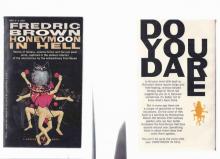 Hall of Mirrors
Hall of Mirrors Honeymoon in Hell
Honeymoon in Hell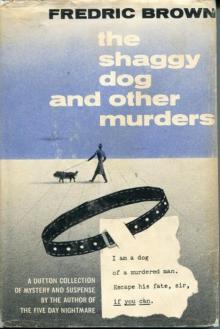 The Shaggy Dog and Other Murders
The Shaggy Dog and Other Murders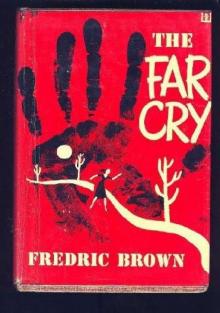 The Far Cry
The Far Cry Arena
Arena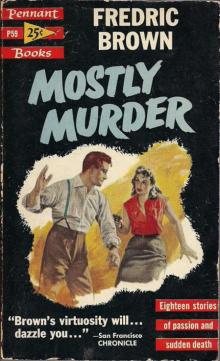 Mostly Murder
Mostly Murder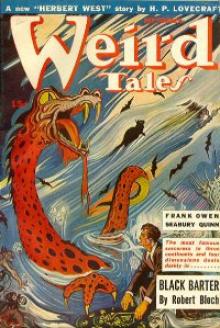 The Geezenstacks
The Geezenstacks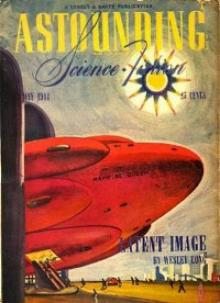 The Yehudi Principle
The Yehudi Principle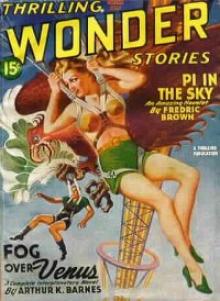 Pi in the Sky
Pi in the Sky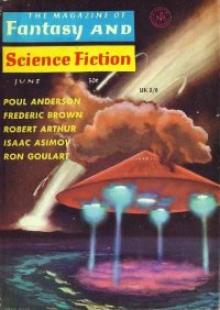 Eine Kleine Nachtmusik
Eine Kleine Nachtmusik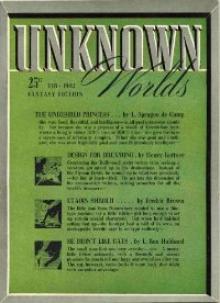 Etaoin Shrdlu
Etaoin Shrdlu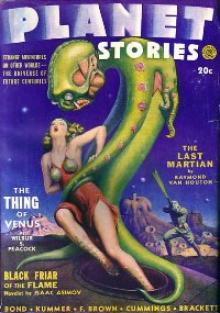 The Star Mouse
The Star Mouse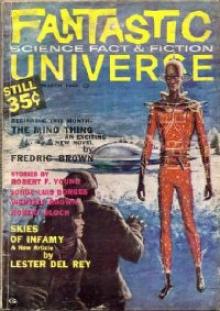 The Mind Thing
The Mind Thing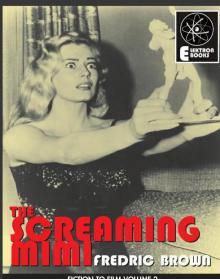 The Screaming Mimi
The Screaming Mimi The Fabulous Clipjoint
The Fabulous Clipjoint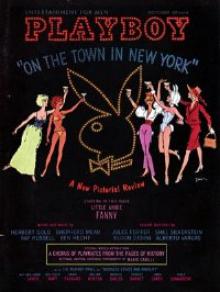 Puppet Show
Puppet Show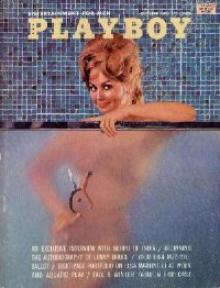 It Didn't Happen
It Didn't Happen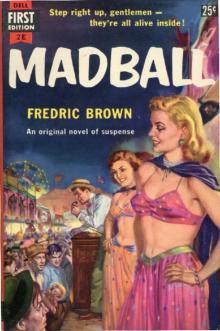 Madball
Madball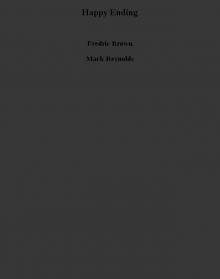 Happy Ending
Happy Ending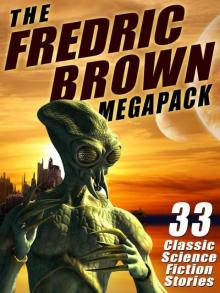 The Fredric Brown Megapack: 33 Classic Science Fiction Stories
The Fredric Brown Megapack: 33 Classic Science Fiction Stories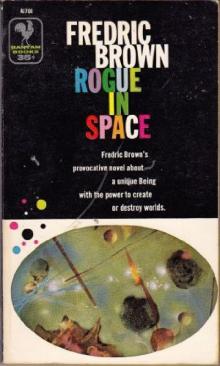 Rogue in Space
Rogue in Space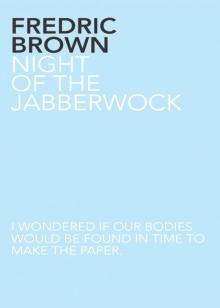 Night of the Jabberwock
Night of the Jabberwock The Dead Ringer
The Dead Ringer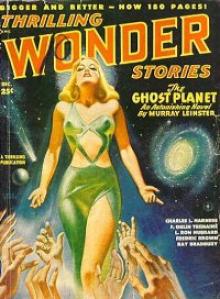 Knock
Knock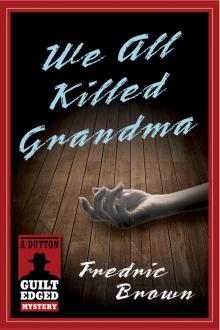 We All Killed Grandma
We All Killed Grandma Space On My Hands
Space On My Hands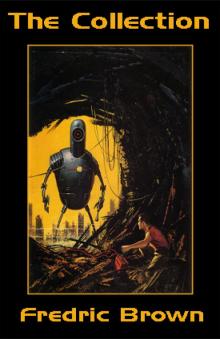 The Collection
The Collection The Second Fredric Brown Megapack: 27 Classic Science Fiction Stories
The Second Fredric Brown Megapack: 27 Classic Science Fiction Stories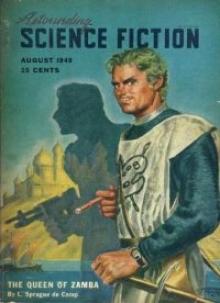 Letter to a Phoenix
Letter to a Phoenix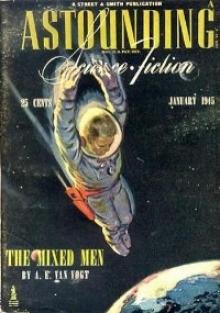 The Waveries
The Waveries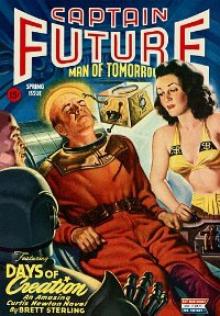 Nothing Sirius
Nothing Sirius The Deep End
The Deep End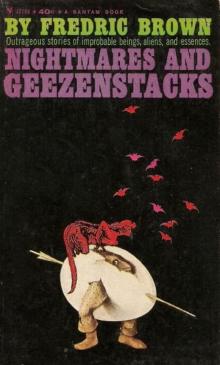 Nightmares & Geezenstacks
Nightmares & Geezenstacks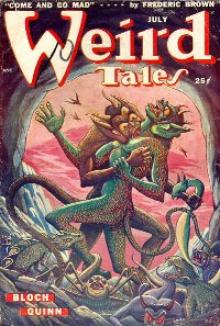 Come and Go Mad
Come and Go Mad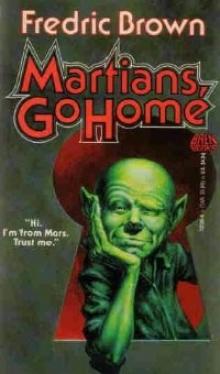 Martians, Go Home
Martians, Go Home